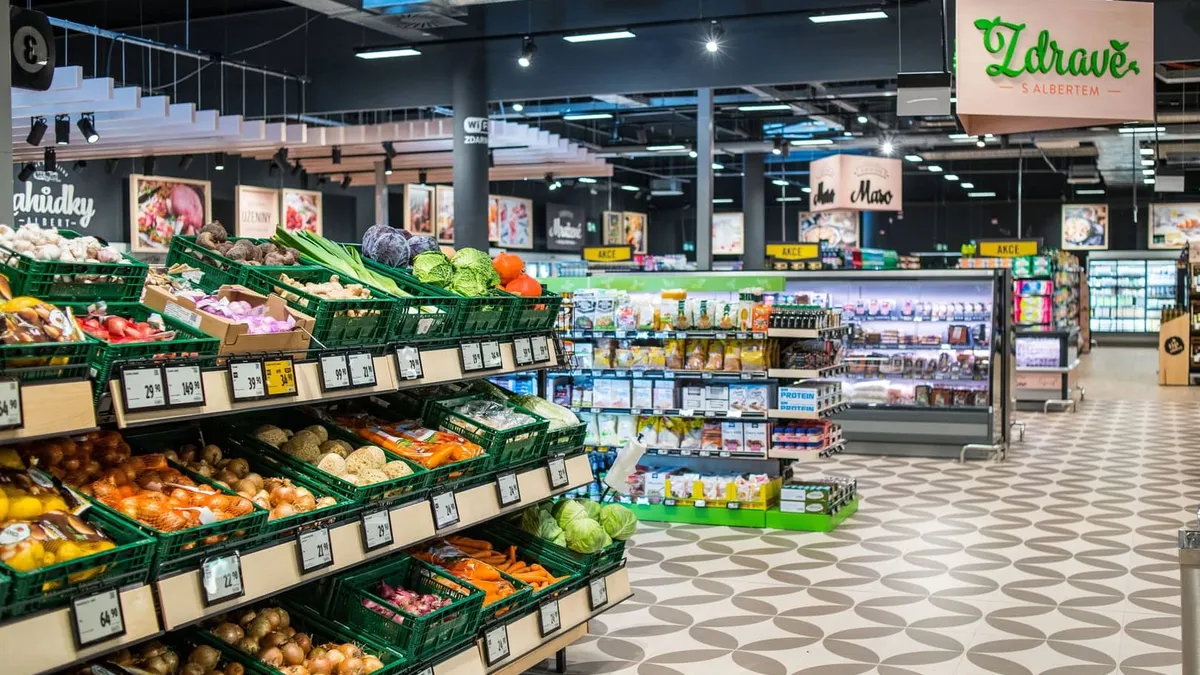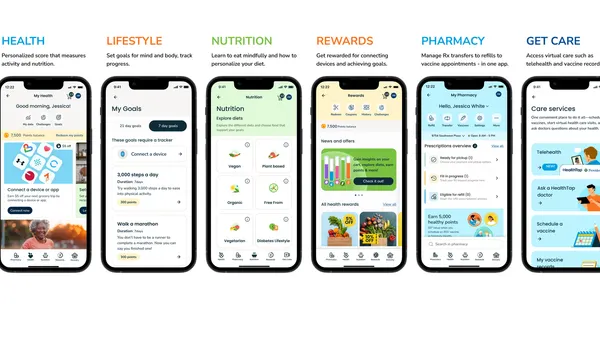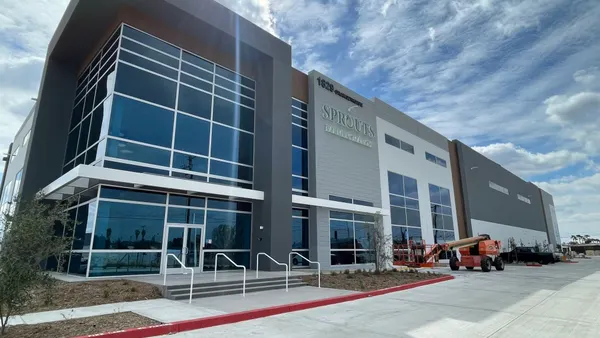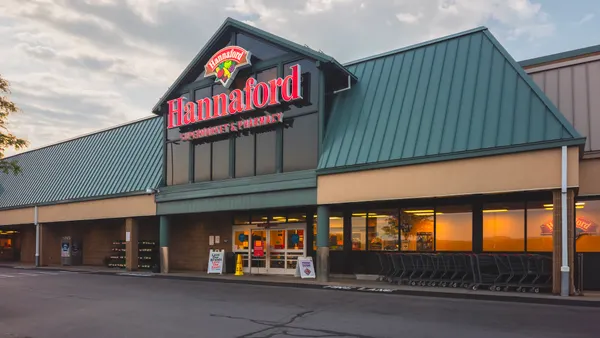Aisles Abroad is a regular feature that examines notable grocery initiatives outside the U.S.
Ahold Delhaize has a strong track record for pushing sustainability efforts, especially with its Albert Heijn banner in Belgium and The Netherlands.
Along with pressure from consumers and employees to tackle sustainability that other companies also face, Ahold Delhaize has another motivation to take on climate-related issues: financial incentives. The company has continually tied its funding strategy to its sustainability and ESG efforts. Last year, Ahold Delhaize priced its inaugural green bond at €500 million ($530 million) — that transaction followed three previous ESG-linked financings.
Earlier this month, Ahold Delhaize and four other grocers joined forces to establish a venture capital fund that will invest $125 million over five years in small businesses that support in-store and online shopping experiences as well as sustainability initiatives.
Ahold Delhaize has said that it’s made “significant strides” in its greenhouse gas (GHG) emissions-reduction efforts, with recent developments including updating its Climate Plan for reducing Scope 1, 2 and 3 emissions at the end of 2023. Last month, the company announced it updated its Scope 3 targets to the latest Science Based Target initiative (SBTi) methodology.
In December, Ahold Delhaize appointed Woolworths Group’s Chief Sustainability Officer Alex Holt as its next chief sustainability officer, effective no later than June 1, 2024.
Ahold Delhaize, particularly its European brands, has already started on efforts to achieve topline goals that include cutting emissions and reducing food waste. Here’s a look at some of the innovative ways Ahold Delhaize is promoting sustainability efforts through its European banners.

Helping suppliers with sustainability
Supplier emissions, categorized as Scope 3 emissions, have long plagued companies as a challenging area to tackle in their climate-focused efforts, and Ahold Delhaize has identified its supply chain as its “biggest challenge.”
The majority of Ahold Delhaize’s Scope 3 emissions stem from products and services purchased linked to suppliers, and Ahold Delhaize noted that mapping the emissions from suppliers’ product ingredients and packaging materials is a major challenge that requires supplier input.
In February, the company announced its European banners launched open-source online platforms where suppliers can get insights into carbon emissions, access resources to help address emissions and learn about the grocery company’s pledges.
Dubbed “climate hubs,” the new online platforms aim to help suppliers with decarbonization through instructional videos and links to external resources such as the Greenhouse Gas Protocol and SBTi. Ahold Delhaize noted that it encourages suppliers to set emissions-reduction targets through the SBTi.
The climate hubs started as an Albert Heijn initiative but went live across Ahold Delhaize’s Albert, Alfa Beta, Delhaize Belgium, Etos, Gall & Gall, Maxi and Mega Image banners by the end of last year.
In March 2023, Albert Heijn opened its Better for Nature and Farmer Program, which allows the grocery banner to make agreements about sustainability and innovations with suppliers to third parties.
The addition of third parties is transforming the program from a “private company logo to a more widely accessible label,” Ahold Delhaize said in a press release. The program, which began in 2017 and now has more than 1,200 farmers and growers participants, has also recently started using a scanner powered by artificial intelligence to help better determine the shelf life of strawberries.
“Because the shelf life of each strawberry harvest varies – for example, due to weather conditions – sometimes strawberries last three days, and sometimes a whole week. This varying quality can lead to food waste,” according to Ahold Delhaize’s 2023 annual report.
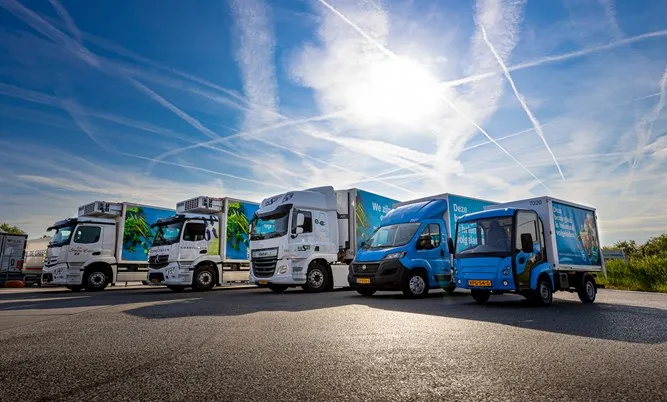
Reducing banners’ carbon footprints
Albert Heijn has taken strides recently to cut carbon emissions as it looks to achieve net-zero emissions in 2050.
Recent efforts include achieving 100% electric transportation in four major Dutch cities, stopping the use of air transportation for goods and signing a long-term deal with energy supplier Eneco to purchase green energy from a Dutch wind farm. The agreement with Eneco will allow Albert Heijn to get roughly half of its electricity needs from the wind farm starting in 2027, according to Ahold Delhaize’s 2023 annual report.
Albert Heijn has already decreased its Scope 1 and 2 emissions by 87.5% since 2018, primarily by switching to 100% Dutch wind energy, the report noted.
Other Ahold Delhaize banners in Europe are also tackling their own business emissions. Mega Image offset a portion of its carbon footprint by planting 12,000 trees in a “Mega Forest” in Romania while Alfa Beta in Greece is installing photovoltaic systems, which generate power using devices that convert energy from sunlight into electrical energy through semiconducting materials, at its stores, per the report.
Nudging consumer choices
To help shoppers make healthier and more sustainable choices, Ahold Delhaize banners are using their loyalty programs to encourage customer behavior. For example, Delhaize’s SuperPlus program offers customers a discount on fresh products with NutriScore A or B.
Albert Heijn has a free app called AH My Lifestyle Coach to help users eat better, exercise more, relax and improve their sleep through tasks, recipes, workouts, articles and coaching. Ahold Delhaize said in its annual report that the app’s coaching was developed with scientists to focus on sustained behavioral change across life stages.
Last year, Albert had two one-month-long campaigns offering hundreds of organic items at regular prices, the annual report noted.
To make recycling easier for consumers, Mega Image in Romania has added return vending machines for beverage bottles in 800 stores across the country — a move that ties into Romania’s launch of a deposit return system for drink containers that then get recycled, according to Ahold Delhaize’s annual report. The system allows people to buy beverages for a fee that they get refunded when they return the empty container. Mega Image sells products eligible for the program and now lets customers return the containers.
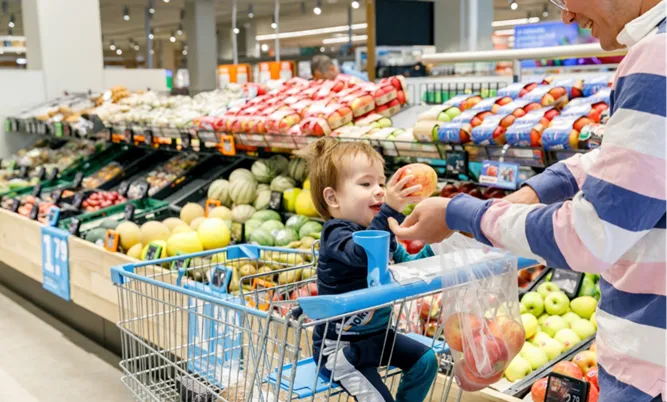
Progress on packaging and private label
Albert Heijn debuted last fall a private label line called AH Terra of around 200 plant-based products. The company noted in its annual report that it plans to add more items to the line.
The new private label line is a part of the efforts by Ahold Delhaize’s European banners to increase their assortment of plant-based items and boost the visibility of those offerings to consumers.
In collaboration with technology company Avantium N.V., Albert Heijn is planning to use Avantium’s 100% plant-based and circular material polyethylene furanoate in “various forms of packaging,” starting with the banner’s new fruit juice bottle, per Ahold Delhaize’s annual report.
Alfa Beta introduced new packaging for organic tomatoes, apples and pears that reduces roughly 9,000 pounds of plastic usage annually, while Albert Heijn replaced plastic bread clips with paper.
Ahold Delhaize noted in its annual report that several Albert hypermarkets have “packaging-free” walls with modules of products in “smart” or reusable packaging. The food modules include dry goods like mixes, cereals, pasta and seeds — with roughly half from the Nature’s Promise line — while the drugstore section has items like baking soda, soap and shampoo.
For grocery items, customers can use “smart reusable resealable containers” that they can return to the store or bring their own containers. An Albert hypermarket in Chodov, Czech Republic, for example, has more than 80 items in smart packaging, according to the report.



